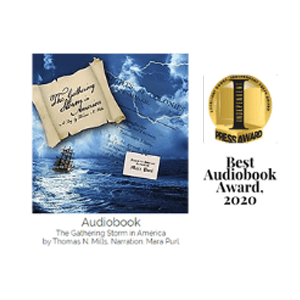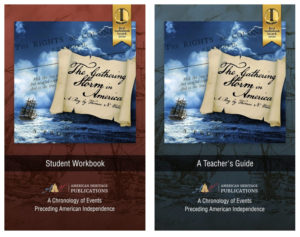 History tells us that the American Revolution began because the colonists refused to pay taxes levied by the Crown. Although “No taxation without representation” was the rallying call of the revolutionary movement in the colonies of America, there was another underlying cause fueled by arrogance, discrimination, misunderstanding, and misinformation that was evident during this time.
History tells us that the American Revolution began because the colonists refused to pay taxes levied by the Crown. Although “No taxation without representation” was the rallying call of the revolutionary movement in the colonies of America, there was another underlying cause fueled by arrogance, discrimination, misunderstanding, and misinformation that was evident during this time.
Mercy Otis Warren was the first woman to publish a first-hand history of the American Revolution. She reads an article from The London Chronicle as she begins her narrative from the award-winning audiobook, The Gathering Storm in America (2020).
New England was settled by Presbyterians and Independents who took shelter there from the persecutions of Archbishop Laud in 1620. They still retain their original character. They generally hate the Church of England.
The article, written anonymously, goes on to say,
England has produced sharp acute men, fit for war or learning, whereas the colonists are remarkably simple or silly, and blunder eternally. We have 6000 of their militia, which the General would willingly exchange for 2000 Regulars. They are forever marring our plans. They can, some of them, at least range in the woods, but 500 Indians with their yell will throw 3000 of them into a panic, so much so that they will shoot one another. Our Regulars are afraid to be on a command with them on that very account.
Today, we would call the article “fake news.” But readers in London would assume that the report came from someone in the field of battle. The colonies had sent their militia, whose experience in fighting the Indians would prove helpful to the British in winning the French and Indian War. Characteristically, Benjamin Franklin’s response to the editor of the London Chronicle combines both wit and diplomacy in setting the record straight. However, one might ask why Mr. Anonymous would write such a letter, and significantly, why The London Chronicle would print it without an ounce of verification.
As a result of what Mercy refers to as the common prejudice against us, she goes on to say, “We were happy to serve England in this contest.” While in England, the “common folk” in a class-ridden society began calling their cousins “our subjects in America.”
The colonists whose ancestors came to America to escape religious persecution from England in the 1600’s held fast to religious beliefs that caused them to be separated from English society. They left their home country and risked their lives in coming to America. With no help from Great Britain, they farmed the land, fought Indians, and provided England with the raw materials that she needed for her commerce.
The colonies began to prosper by providing the mother country with tobacco, rice, and cotton from the south, grains grown in the middle colonies, and furs, fish, and the straight limbs from tall trees needed for ships of trade in the north. As an island nation, Great Britain’s resources were limited, so the natural resources in America were of great importance. Trade with Great Britain was mutually beneficial. And the colonies had a direct and ready market for their commerce.
Prime Minister, William Pitt (Lord Chatham) recognized the value of the land and resources in America. He doubled his troops and sent his best generals to win the French and Indian War in America. He saw the value of land that was contested by England and France in the rich Ohio Valley. As a result of his efforts, England won the war, and the Paris Peace Treaty awarded England all of the land east of the Mississippi River and all of Canada as well. England had more than doubled their holdings in America!
King George III replaced his grandfather, George II, in 1760. The Whigs who ran Parliament during the reign of George II had a vision that economic growth in England could be doubled through trade and manufacturing from the raw materials in America. This, they thought, would solve the issue of the national debt accrued by a nation constantly at war. Then, after 30 years of Whig rule in Parliament, George III brought conservative Tories to positions of power and things began to change.
Parliament began by designating the Ohio Valley as an Indian reserve. They expanded the British army in North America to 7,500 men after Pontiac’s Rebellion, and stationed them in a long chain of western forts along the frontier. The colonists who had been promised land in the Ohio Valley for their participation in the war were ordered to leave. The Americans, they said, should pay the cost for maintaining an army on the frontier. Then there were duties to be paid on the importation of sugar and molasses which was connected with the prosperity of New England. For years, the colonies in the north had traded fish, which the English didn’t want, for French molasses that was cheaper than English molasses. The molasses was distilled into rum in New England for home consumption, and for trade. This was a means for making payment to England for the imported goods that the colonists purchased and she manufactured.
The Sugar Act was followed by the Stamp Act, and over the next 10 years, several other acts were levied, not only to cover the cost of the French and Indian War, but to pay for the cost of governors in the colonies who were now to draw salaries from the Crown instead of by the colonial assemblies.
The colonists reacted by sending petitions to Parliament. They cited the Magna Carta, the Petition of Rights presented to Charles I by Parliament, and the Bill of Rights agreed to by William and Mary after the abdication of James II to the throne of England. Parliament ignored the petitions and sent troops putting the Massachusetts Bay Colony under military control after the Stamp Act riots.
The colonists called the Stamp Act and the other taxes illegal. They were violations of the English Constitution. Thus the call for “No Taxation Without Representation.”
The storm clouds were forming. Would these Yankee Doodles oppose the most powerful military force in the Western world? When would the reckoning come?
We are pleased to announce that The Gathering Storm in America has been awarded the Independent Press Best Audiobook for 2020!
 The Audiobook has been incorporated into a Teacher’s Guide and Student Workbook for the first in a series of stories of the American Revolution by American Heritage Publications. Through storytelling, the curriculum becomes an engaging mini-course on the history of Pre-Revolutionary America.
The Audiobook has been incorporated into a Teacher’s Guide and Student Workbook for the first in a series of stories of the American Revolution by American Heritage Publications. Through storytelling, the curriculum becomes an engaging mini-course on the history of Pre-Revolutionary America.
Designed for classrooms, distance, and blended learning, it is offered Free through Labor Day for students at home during the Corona virus pandemic. Following the National Standards for History, we think that students will enjoy making the connections between what was happening in the beginning stages of the American Revolution with what is happening in America today. And enjoy history in the process!
To download your free copy, go to American Heritage Publications

Or to Teachers Pay Teachers
Please allow 2 – 3 weeks for students to complete this mini-course in American History.
We look forward to hearing from you and learning about your online adventure!
